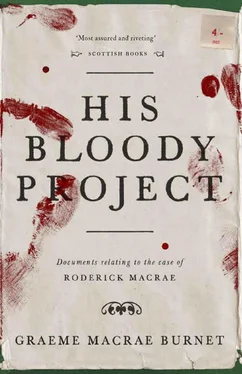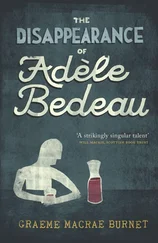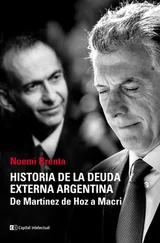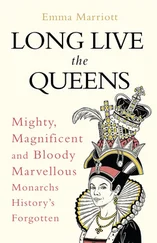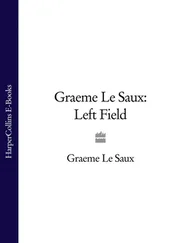‘Would it be fair to say that Mr Mackenzie and Mr Macrae were not the best of friends?’
‘It would be fair.’
‘And this enmity between them, if I can put it in such a way, pre-dated this incident with the sheep?’
‘Yes.’
‘So how did this enmity arise?’
Mr Murchison held out his hands. ‘I cannot say.’ He puffed out his cheeks and let forth a ‘baffled sigh’. ‘Mr Macrae lived at his end of the village and Mr Mackenzie lived at his.’
Mr Gifford appeared content not to labour this point. ‘Nevertheless, an agreement was reached which left Mr Macrae indebted to Mr Mackenzie?’ he said.
‘Yes.’
Mr Gifford then led the witness through the process of Lachlan Broad’s election to the position of village constable.
Mr Gifford: ‘Would it be fair to say that this role in your community was not a popular one?’
Mr Murchison: ‘In what sense?’
‘In the sense that it was not a position which members of your community sought out?’
‘I would say so, yes.’
‘Then you must have been pleased that Mr Mackenzie took it upon himself to shoulder this burden?’
Mr Murchison made no reply.
Mr Gifford: ‘You were not pleased?’
‘I was neither pleased nor not pleased.’
‘But is it not true that you and some other members of your community made great efforts to find an alternative candidate to oppose Mr Mackenzie?’
‘Some effort was made.’
‘Why did you feel the need to do that?’
‘It did not seem right that Mr Mackenzie should be elected unopposed.’
‘That was the only reason?’
Kenny Smoke hesitated for a few moments, before responding, ‘There was a perception that Mr Mackenzie might use his powers to advance his own interests.’
‘You mean, the powers inherent in the role of village constable?’
‘Yes.’
‘And did he do so?’
‘To some extent.’
‘To what extent?’
‘He enjoyed wielding power over the community.’
‘Can you be more specific?’
‘He instituted a scheme of works whereby the men of the community were obliged to give their labour for a certain number of days.’
‘And what was the purpose of this scheme of works?’
‘General improvements to the roads and drainage around the villages.’
‘Were these schemes, as you put it, in advance of his own interests?’
‘Not specifically.’
‘Not specifically?’
Mr Murchison made no reply to this.
Mr Gifford continued: ‘Were these improvements to the benefit of the community in general?’
‘They were of benefit, yes.’
‘So Mr Mackenzie instituted a scheme of improvements beneficial to the community and the men of the community contributed their labour towards this scheme?’
‘Yes.’
‘And this you describe as being in advance of Mr Mackenzie’s own interests!’ Mr Gifford at this point directed an expression of bewilderment towards the jury.
‘Now,’ he continued, ‘if I can turn to another incident, would it be true to say that arable land is in short supply in your village?’
‘It is not plentiful.’
‘And how is the land allocated?’
‘Each family has their rig.’
‘“Each family has their rig”,’ he repeated. ‘The rig being their portion of the available land?’
‘Yes.’
‘And is this land allocated on a yearly basis, for five years, or for how long?’
‘In practice, each household farms the land which lies between their house and the Toscaig road.’
‘That portion being regarded, to all intents and purposes, as their land?’
‘Yes.’
‘So, in effect, each strip of land belonged to the property to which it was adjacent?’
‘In effect, yes.’
‘Without regards to the population or make-up of the household?’
‘Generally, yes.’
‘Shortly after Mr Mackenzie’s election to the position of village constable some of the arable land in Culduie was re-allocated, was it not?’
‘Yes.’
‘Could you describe that re-allocation?’
‘A portion of Mr Macrae’s land was given to his neighbour, Mr Gregor.’
‘Why was that?’
‘As there were more people in Mr Gregor’s household than in Mr Macrae’s, it was decreed that they required more land.’
‘I see. And how many people were in Mr Macrae’s household?’
‘Five, including the two infants.’
‘That would be Mr Macrae himself, the prisoner, his daughter and the two younger children, aged three years?’
‘Yes.’
‘And in Mr Gregor’s household?’
‘Eight.’
‘And how was that household constituted?’
‘Mr Gregor and his wife, Mr Gregor’s mother and their five children.’
‘So their need for land was greater than that of the Macrae household?’
‘Yes, but —’
‘Did Mr Mackenzie personally benefit from this distribution of land?’
‘No.’
‘So, it was quite fair to re-distribute this land in accordance with the greater need of the Gregor household?’
‘You could say that it was fair.’
‘I am asking if you would say it was fair, Mr Murchison.’
Before answering Mr Murchison drew his hand across his moustaches and surveyed the court-room.
‘It was not right,’ he said.
‘But you have stated that the Gregor family’s need for land was greater than that of the Macraes.’
‘It might have been fair in law,’ said Mr Murchison, clearly by now becoming aggravated, ‘but it was not done. Crofts are not divided up in this way. Each family works their portion of land and it passes from one generation to the next.’
‘I see. So Mr Mackenzie’s action was unprecedented?’
‘It was vindictive.’
‘Ah!’ said Mr Gifford, as if he had finally succeeded in reaching the nub of the matter. ‘“Vindictive” is a strong word, Mr Murchison. So rather than using his powers for the general good, Mr Mackenzie was perceived to be pursuing some kind of vendetta against Mr Macrae?’
‘Correct.’
Mr Gifford directed a meaningful look to the jury, then thanked the witness and concluded his questioning. The Scotsman noted that Mr Murchison ‘seemed a fine fellow, but his baffling adherence to the idea that land should be allocated on the basis of tradition rather than utility was yet another example of how the intransigence of the Highland tribes is bringing about their own demise’.
Mr Sinclair then rose for the defence.
‘For how long have you known the prisoner?’
Mr Murchison: ‘All his life.’
‘And how would you characterise your relationship with him?’
‘I like him well enough.’
‘Would you describe him as feeble-minded?’
‘Feeble-minded? No.’
‘Then how would you describe him?’
Mr Murchison puffed out his cheeks and looked towards Roddy, who looked back at him with a faint smile.
‘Well, there’s no doubting he’s got a brain in his head. He’s a clever lad, but —’
‘Yes, Mr Murchison?’
The witness cast his eyes towards the ceiling as if searching for the right words. He shook his head and then said, ‘He’s daft.’
‘“Daft”?’ repeated Mr Sinclair. ‘Could you explain what you mean?’
Again Mr Murchison seemed to struggle to express himself. ‘He sometimes seemed like he was in a world of his own. He was always a solitary boy. I never saw him playing with other children. He could be sitting amongst folk, but, for all the world, it was like there was nobody else there. You never knew what was going on in his head.’
‘And he was always like this?’
‘I believe so.’
Mr Sinclair allowed some moments to pass before putting his next question. ‘Did you ever observe the prisoner speaking to himself or appearing to be in conversation with another person who was not there?’
Читать дальше
